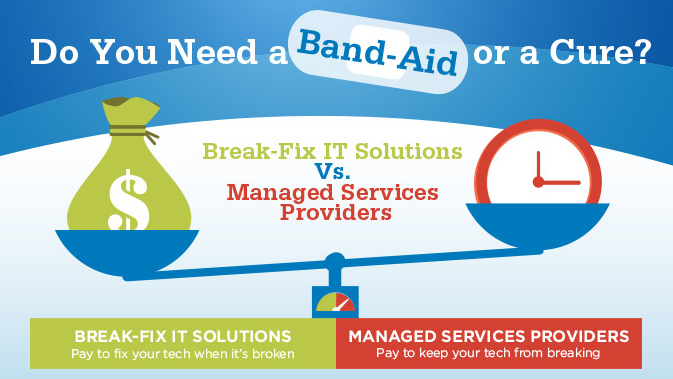4QuartersIT: Blog

Do I need Managed Services? How to decide which MSP is right for me?
In our recent blog titled “6 Major Advantages of Managed Services that take your Organization to the Next Level”, we outlined several advantages of the Managed Services approach to IT Management and discussed the concept of the “Managed Service Provider” (MSP). This week’s blog aims to take the conversation one step further by answering the questions; “Do I need Managed Services?” and “How do I decide which MSP is right for me?”. Let’s dive right in.
Do I need Managed Services?
While there is no “one-size fits all” answer to this question, our experience has taught us that almost all Small and Medium Businesses (SMB’s) stand to benefit from a Managed Services approach. Most SMB’s are already using services such as; Anti-Virus/Anti-Malware, Anti-Spam, and Data Backup, and are often paying for these services separately. In addition, the SMB often pays a separate bill for reactive “Break/Fix” IT support which, as we’ve discussed previously, is only addressing technical problems after those technical problems have caused a significant disruption to business. When we combine the costs of the individual services, like Anti-Virus and Data Backup, with the costs from downtime and productivity loss caused by the old reactive IT management approach, the benefits of a Managed, Proactive approach become clear. Businesses that have made the switch to Managed Services often wonder how they ever got by without it!
How do I decide which MSP is right for me?
Now that you’ve determined that the Managed Service approach is right for your business, the next step is selecting a Managed Services Provider. While the process for selecting the MSP that is right for your business can be complex, it doesn’t have to be intimidating. Below are a few important criteria to consider when considering an MSP’s services.
Size – When most SMB’s need legal or accounting services, they don’t immediately seek out the largest legal or accounting firms. Because hiring an MSP is, first and foremost, a business partnership, finding an MSP that aligns with your organization’s size and structure is highly recommended. You don’t want to end up being one of thousands of “small” customers of a giant MSP, nor do you want to partner with a small MSP to find that they aren’t equipped to meet your organization’s needs.
Cost – While there is no industry standard rate for MSP services, most MSP’s rates will be comparable. Just as it would be natural to wonder why any MSP’s rate would be significantly higher than the average rate for your area, it should also be natural to ask why any MSP’s rate would be significantly lower than the average rage for your area. As with most things, if it sounds too good to be true, it probably is.
Personalized Service – As mentioned above, the hiring of an MSP is a business partnership. Because the MSP is now fully responsible for the management of your organization’s IT services, the MSP has a vested interest in getting to know your organization inside and out. Any MSP you consider should have a process in place whereby they work to become intimately familiar with your organization and its unique needs. This process should include ongoing knowledge transfer sessions and periodic business reviews to keep you up to date on your IT system’s status.
Familiar with industry – Lastly, your MSP candidate should be familiar with the technological needs of your industry. While there are certainly technology needs that exist regardless of the industry (i.e. all computers need Anti-virus, everyone uses email, etc.) having an MSP with experience in your specific industry will provide an extra layer of value to you and your organization. Having a broad customer base is a good indicator that an MSP will be able to add value to your business over and above the day to day technology management benefits gained by using Managed Services. Always ask for client references!
As you can see, after the decision to implement Managed Services has been made, there are many things to consider before selecting your new MSP partner. By following the recommendations outlined above, your MSP search and selection process should run smoothly and should provide the foundation for a strong partnership.






